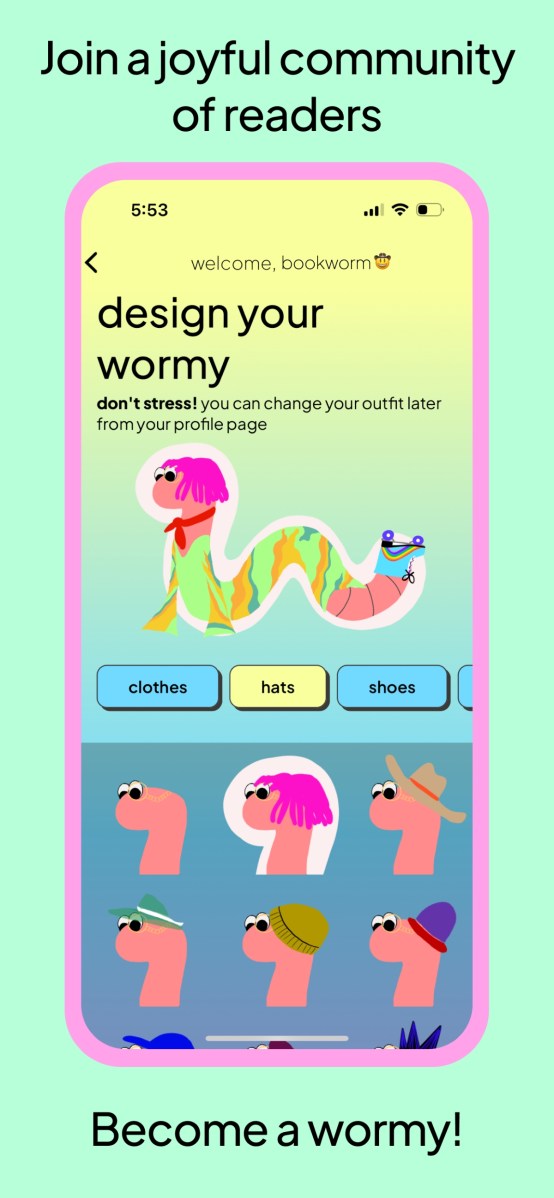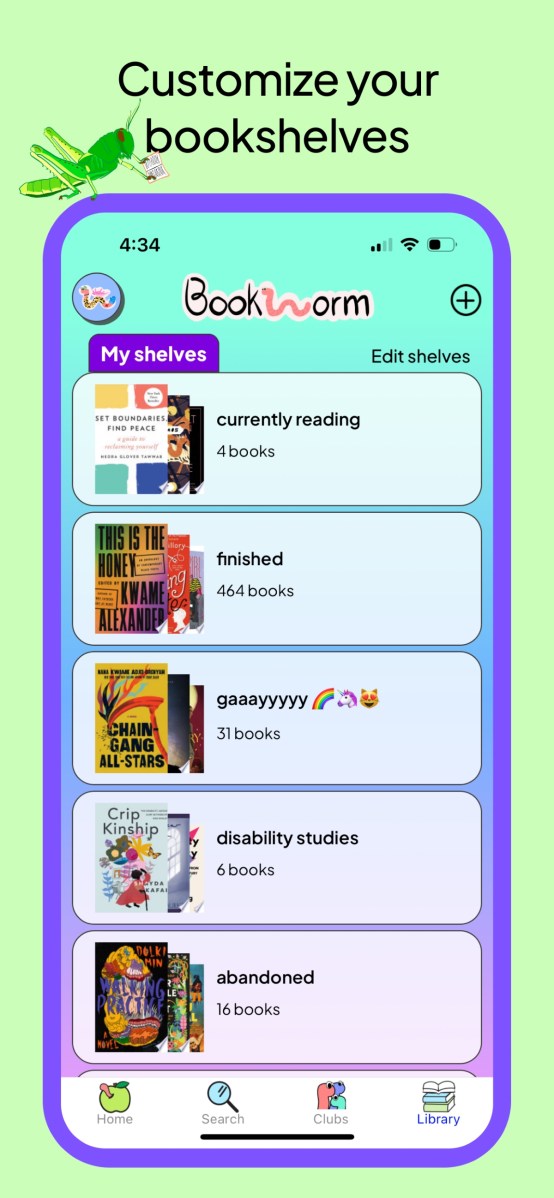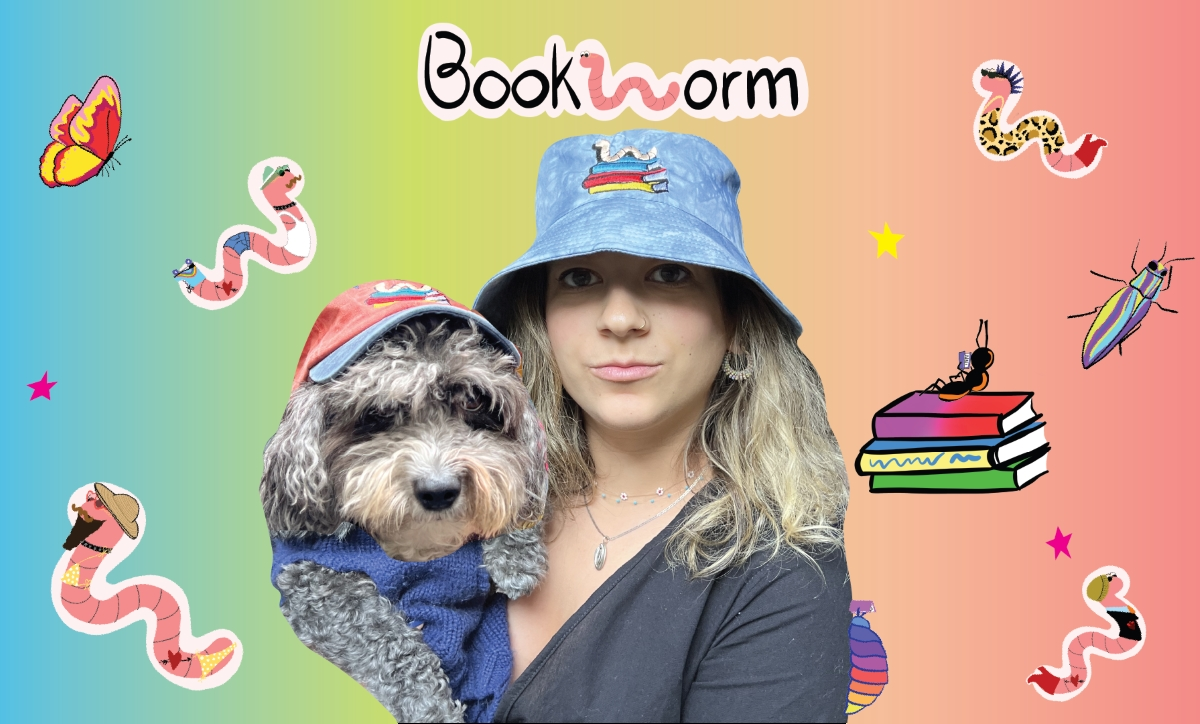As more readers break up with Amazon-owned Goodreads, alternatives like Storygraph and Fable are becoming increasingly popular hubs for people to create shelves, track their reading, set goals, form communities, and participate in book clubs.
Amelia Goodman’s Bookworm Reads not only offers the tools above, but also allows you to design your own worm avatar.
“Everyone has this reaction when they’re dressing up their worm where they’re like, ‘Oh, this is the outfit. That’s me. That’s me as a worm.’ And I love that everyone can find that and that it’s such a universal experience of seeing yourself in this little cartoon worm,” Goodman tells The Mary Sue. “The other thing that I’ve really loved is being out in the world and talking about Bookworm and someone will be like, ‘Oh my God, you’re worm girl.'”
Goodman is a software developer who wanted to divest from Amazon fully but didn’t want to lose the years of book tracking she’d accumulated on Goodreads. She initially built a personal reading tracker that was colorful and cute, then realized she could make it community-oriented. Bookworm Reads went public in January 2022, and there’s been a huge spike in new users as more people cut ties with Amazon—Goodman says most new users import their Goodreads libraries upon joining. The day before our interview, the app hit 25,000 users.
“The community aspect is just so beautiful. I think we really center diverse books and the conversations are just really different from Goodreads,” Goodman tells us. “Mostly the conversations are just very positive, kind, and considerate.” She says the app also stands out for “the color and I guess the vibe. The fact that it is this community-oriented place for book nerds to gather and chitchat, and then you get a worm that you dress up and the colors of the app are just so bright and colorful and pretty.”

Six people work behind the scenes at Bookworm, and all of them are volunteers. The app has a “Pro Worm” subscription where users can pay monthly ($4.99) or yearly ($49.99) to support the developers and unlock special features, like exclusive worm colors, besties to hang out with your worm, a merchandise discount, a profile badge, and priority support from the team. At the moment, Goodman is the only person working full-time on the app, and she says Bookworm makes enough money to break even. Eventually, she wants to be able to pay everyone.
“We’ve created this team of people who all volunteer and who have all come from the app who say, ‘I love what you’re doing. I have these skills. I want to do this with you.’ That feels really, really special. I used to work in tech and I had to leave because it was just so terrible and toxic,” Goodman says. “To have this experience where we all are just so kind and supportive of one another, and everyone’s doing this for free because they love Bookworm and believe in it: I think that feels just so special and wonderful.”
Recently, this small, volunteer team has rolled out several impressive features. In addition to a full design rehaul, better shelf organization, and the implementation of book clubs, the app has also introduced annual reading challenges to accompany its beloved seasonal ones. Goodman and her team rely on a small contingent of beta users to give feedback on each app update before it goes live in the Android and Apple stores. (Disclosure: I’m a beta user.)
“In terms of how things get done and when, it’s primarily community-driven,” Goodman explains. “Right now we’re trying to get more people to go Pro, which is how we fund Bookworm so that I’m not paying for it out of pocket. There’s a lot of thought behind what things people are requesting and what they would pay for or what would incentivize them to go pro. A billion projects are going on at every moment.”
Goodman admits that since she does all of the coding for the app, she prioritizes features that are more joyful for her to break things up. Goodman says it feels especially great whenever the team rolls out a highly-requested feature, like the ability to tag other users in comments.
“Something I’m working on right now is allowing people to add books to their libraries,” she says. “We have a backlog of 200 books that aren’t in our book database that have to be manually entered, and we recently came up with a way to get around that manual moderation by just allowing people to add books to their private libraries.”

Beyond the work that goes into the app itself, Goodman has also partnered with other organizations like the Brooklyn-based mobile mutual aid initiative The Nonbinarian Book Bike to reach more potential users and help build a local bookish community.
“The people are so nice to each other and so engaged and everyone is just such a book nerd,” she says.
The books we’re talking about are just incredible and authors are excited to get engaged. I don’t feel like I can put a finger on how it happened, but it happened and it’s gorgeous. Every community post just warms my little heart.”
Goodman says the hardest aspect of creating and sustaining Bookworm Reads is that getting people to invest in a small business created by a woman—especially one that’s built on a foundation of not exploiting its users—is an uphill battle. As she looks toward the future, she’s looking at options for how to restructure the app’s business model into a co-op or something similar so it can remain a community-oriented space that doesn’t rely on big investors to stay afloat.
“Partnering with bookstores is a dream of mine. And then building the app out and creating a bigger and better space for all things books—like whatever you could imagine wanting from a book app—having that in Bookworm and always keeping that ethos of, ‘This is a friendly and beautiful community and we’re not exploiting people,'” she says.
Goodman wants to find more tangible ways to support independent bookstores and help consumers break up with Amazon for good: “Amazon has all the resources you could possibly need to easily address all of the issues with Goodreads—like how ugly and hard to use it is, but more importantly protecting authors and addressing the hate on the platform—but they choose not to because they simply don’t care.
“Amazon will never care about readers or authors or any part of the book ecosystem—look at how they sell books at a loss to drive out competitors, or buy out any players in the space (Goodreads, Abe Books, Audible, Comixology),” Goodman says. “They are only profit-seeking. And that’s dangerous for so many reasons! And I hate it! And I wholeheartedly believe that the antidote is supporting indie book apps—like Bookworm, Storygraph, and ItalicType—that are building these spaces for the love of reading and books.”
Bookworm Reads is available for Android and Apple devices. It also has a simplified browser app.
(featured image: Bookworm Reads)









Published: Mar 22, 2024 04:44 pm